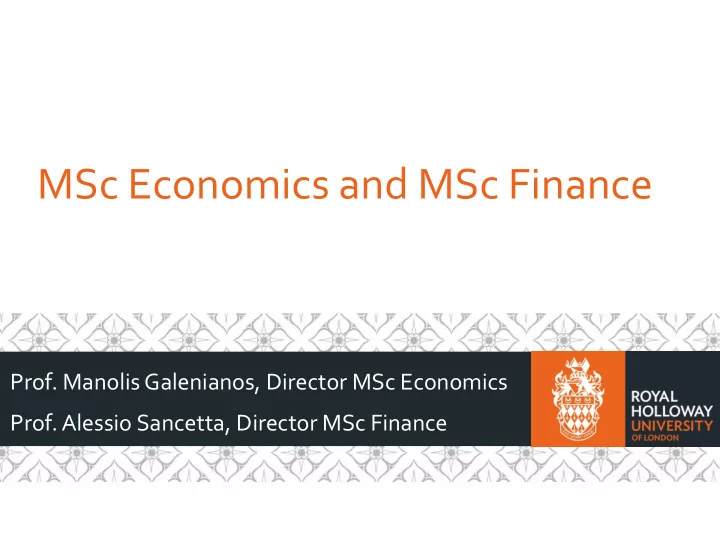

MSc Economics and MSc Finance Prof. Manolis Galenianos, Director MSc Economics Prof. Alessio Sancetta, Director MSc Finance
MSc at the Royal Holloway Economics Department Why an MSc in Economics or MSc Finance? • Acquire deep understanding of economics/finance. • Learn useful tools: analyze statistics, analytical thinking. • Diverse job prospects: private, public, non-profit, academic sectors. Why at Royal Holloway? • Research : Top 10 in the 2014 Research Excellence Framework (UK) - 80% of research “ world leading ” or “internationally excellent”. • Teaching : Specialists teach frontier material. Relevant industry experience • Expertise in a range of economics fields, incl. macroeconomics , industrial organisation , labour economics, and finance. 2
MSc Programmes at Royal Holloway MSc Economics . Small programme (15-20 students), individual attention MSc Finance : Moderate size (40-50 students) MSc Computational Finance : joint with the CS Dept. (15-20 students) Academic year starts in September, ends in August Structure : core in Autumn, optional in Spring, dissertation in Summer Graduation in December 2-year MSc in Econ or MSc Finance : no need for econ/quant background First year – Foundation Year: background courses in Economics Second year – MSc Year: same as MSc Econ or MSc Finance 3
MSc Economics Pre-sessional Autumn Term Spring Term Summer Term (2 weeks, September) (60 credits) (60 credits) (60 credits) REQUIRED: REQUIRED: REQUIRED: DISSERTATION PRE-SESSIONAL MICROECONOMICS EC5000 (60 credits) MATHEMATICAL METHODS EC5110 (20 credits) EC5555 (no credits) CHOOSE 3 FROM: MACROECONOMICS STATA COURSE ORIGINS OF FINANCIAL CRISES EC5360 (20 credits) (Grade counts in EC5000) 5120 (20 credits) INDUSTRIAL ECONOMICS EC5020 (20 credits) ECONOMETRICS ADVANCED TOPICS IN MICROECONOMICS EC5111 (20 credits) EC5040 (20 credits) DECISION THEORY AND BEHAVIOUR EC5070 (20 credits) REQUIRED (no credits): EXPERIMENTAL ECONOMICS EC5240 (20 credits) MATHEMATICAL METHODS 5051 (no credits) PUBLIC ECONOMICS EC5150 (20 credits) RESEARCH METHODS LABOUR ECONOMICS EC5220 (20 credits) (no credits) EVALUATION ECONOMICS EC5180 (20 credits) 4 4 FINANCIAL ECONOMETRICS EC5333 (20 credits)
MSc Finance Pre-sessional Autumn Term Spring Term Summer Term (2 weeks, September) (60 credits) (60 credits) (60 credits) REQUIRED: REQUIRED: REQUIRED: REQUIRED: PRE-SESSIONAL CORPORATE FINANCE DISSERTATION FINANCIAL ECONOMETRICS MATHEMATICAL METHODS EC5310 (20 credits) EC5333 (20 credits) EC5001 (60 credits) EC5555 (no credits) QUANTITATIVE METHODS MATLAB COURSE FOR FINANCE (Grade counts in EC5001) 5330 (20 credits) CHOOSE 2 FROM: FOUNDATIONS OF FINANCE INVESTMENT AND PORTFOLIO MANAGEMENT EC531 (20 credits) EC5320 (20 credits) FIXED INCOME SECURITIES AND DERIVATIVES EC5340 (20 credits) REQUIRED (no credits): PRIVATE EQUITY EC5370 (20 credits) MATHEMATICAL METHODS 5051 (no credits) DECISION THEORY AND BEHAVIOUR EC5070 (20 credits) RESEARCH METHODS ORIGINS OF FINANCIAL CRISES EC5360 (20 credits) (no credits) 5 5
2-year programme – First Year (Foundation Year) Optional courses Pre-sessional Required year-long (one year-long or courses (September) two term-long) REQUIRED: MICROECONOMICS FINANCIAL MARKETS & INSTITUTIONS PRE-SESSIONAL EC4201 /EC2201 (30 credits) MATHEMATICAL METHODS EC2211 (30 credits) EC5555 (no credits) MACROECONOMICS INDUSTRIAL GROWTH AND COMPETITION EC4202 /EC2202 (30 credits) EC2212 (30 credits) QUANTITATIVE METHODS PERSONNEL ECONOMICS EC4203 /EC2203 (30 credits) EC2215 (15 credits) NOTE: separate seminars from ECONOMIC GROWTH undergraduates EC2216 (15 credits) NOTE: Options may change from year to year 6 6
After the MSc: Recent Job Placements Private sector: • Consulting (Ernst Young, KPMG, Frontier Economics). • Investment banking (Barclays, HSBC). • Law/regulation (Ashurst). • Asset management, brokerage (State Street). Public sector: • Government Economic Service. • Department of Energy and Climate Change • Department of Education. Non-profit sector: Qatar Foundation. PhD programmes : RHUL, other universities. 7
Information about applying Info : Economics department/prospective students/post-graduate taught. https://www.royalholloway.ac.uk/economics/prospectivestudents/postgraduatetaught msc/home.aspx Requirements for MSc Economics or MSc Finance: • 2:1 in economics or mathematics/physics/engineering… • Good 2:2 degrees will be considered on an individual basis. Requirements for 2-year programme : 2:1 in any subject. • Online application. • Applications open and processed speedily. 8
Recommend
More recommend